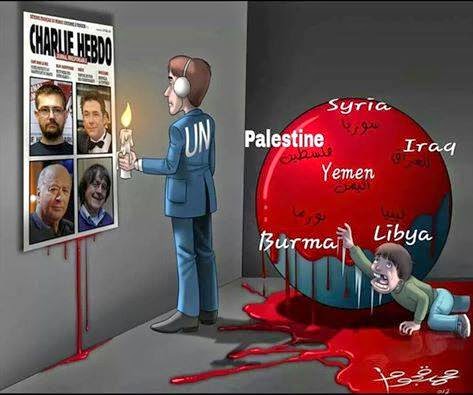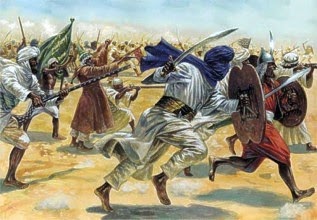The Charlie Hebdo challenge by Ashraf Jehangir Qazi
source = Published in Dawn, January 27th, 2015
In the wake of the Charlie Hebdo killings massive outpourings of Western outrage and resolve to root out terrorist violence have been on display.
Whatever Western views of the cartoons themselves they will not tolerate violence on their territory against their citizens. But they do not bind themselves to the same standards.Their crimes against other societies, if acknowledged at all, are dismissed as well-meaning errors.
US administrations constantly lie ‘we don’t do terror!’ and ‘we don’t do torture!’ They only do counter-terror and enhanced interrogation! Most of which is state terror which constitutes 90pc of global terror. Power controls the narrative.
Our dependent, corrupt and servile leadership falls in line and makes a fabulous living doing so. Pakistan is among the poorest and most deprived countries. Pakistani prime ministers use their office to be the richest. The interests of the people are irrelevant.
Most Muslims believe those who attacked Charlie Hebdo were outraged by its abhorrent vilification of the Prophet (PBUH.) What the magazine claimed to be “irreverence”, “satire” and insouciant political “humour” was in fact premeditated blasphemy designed to existentially wound a whole people.
Given that the Prophet is revered by Muslims (whether practising or not), the gratuitous and malicious defamation of his character was tantamount to denying the validity of Islam and the Muslim community.
Some can shrug off the insult. Some can’t. According to the latter, this deliberate and sustained sacrilege justified the most extreme retribution. This view finds support in Islamic tradition, including Ibn Taymia’s doctrine of “al-Sarim al-Maslul ‘ala Shatim ar-Rasul” (the Drawn Sword against the one who reviles the Messenger.)
The Western narrative is that the offending cartoons of Charlie Hebdo represent a tradition of free expression.
Many moderate, educated and non-violent Muslims share at least part of this sentiment. They may not resort to violence. But they would refrain from condemning those who did in order to “avenge the Prophet”. They march against the execrable cartoons. But they are also aware of how the principle of “protecting the honour of the Prophet” has been blasphemously used to accuse, persecute and murder innocent victims for personal loot. A morally limp state led by political charlatans dare not lift a finger to protect the unprotected against such blasphemy. That is how they buy their personal security. They are a standing insult to the message of Islam.
In the case of Muslim immigrants in the West there is the additional factor of intensified political alienation and social marginalisation. They exist amongst a broader community that by and large equates their traditions and values with terrorist potential. In France the banlieues have no opportunity to integrate.
Other European countries have similar Muslim outcasts. The cartoons of Charlie Hebdo, the desecrations of the Holy Quran in Abu Ghraib and other “black holes”, and unending Western wars against their peoples — are all part of a profane global hegemony that forever robs them of their identity, history, voice, humanity and, indeed, innocence. Many inevitably drift towards a cathartic moment of nihilistic release. Predatory anthropologists and sociologists carve up what is left of them for their theses.
The dominant Western narrative is that the offending cartoons of Charlie Hebdo represent a tradition of free expression that is integral to the identity of France and the West as the home of free peoples. They fought and struggled over the centuries for the right to differ, deny, deride and even denigrate any authority, tradition, idea or person within the limits of the law as approved by their freely elected representatives. They will never compromise this “sacred” secular right.
Accordingly, Muslims who feel deeply wounded by disrespectful depictions of their most precious symbols may vigorously but peacefully protest (permission to do so is often refused) and, if citizens, may seek to bring about legislation constraining the publication and propagation of such materials (as the Jews have done with respect to the questioning of the Holocaust and anti-Semitism.) But they may never take the law into their own hands, and most certainly not commit murder to assuage their outrage.
Otherwise, it is argued, more than 500 years of European political and ethical development including the humanitarian values of the Renaissance and the Enlightenment — which most Europeans see as their proudest achievement and greatest gift to humanity — would perish.
But many Muslim immigrants are convinced that while contemporary European societies are guilt-ridden over what they did to the Jews there is no such compunction for what they have done to the Muslims. For the West, the Jews are ultimately “one of us”. The Muslims, however, are “children of a lesser god” and politically a malignant lesion on the body-politic of the West.
There is, however, an alternative Muslim narrative that is closer to the original and timeless spirit of the message of Islam than the currently dominant narrative which is a later accretion. Many renowned Islamic jurists have advocated against the implementation of Ibn Taymia’s injunction on the basis of the Quranic Surah 6:108 which states “Revile not those unto whom they pray besides Allah lest they wrongfully revile Allah through ignorance.” Another verse commanded the Prophet whenever he saw those who entered into “false discourses about Our communications” to “withdraw from them until they enter into some other discourse.” Sensible pragmatism, not wild extremism, represents religious virtue.
In light of these Quranic injunctions, should our faith, our love for the Prophet and ourselves be defined by our most virulent responses? Most certainly not! Truly, the Prophet came as a Mercy to all humanity. To those who would presume to insult his person the Holy Quran provides an answer that suffices: “lakum deenukum wa liya deen” (to you, your faith; to me, mine!) In Pashto there is a saying “if you spit at the sky you will spit on your face”. The Prophet is beyond the reach of any human impudence. The worlds of Islam and the West can still work together for a more inclusive and less unequal world. But we must be politically rid of dangerous charlatans.
The writer is a former ambassador to the US, India and China and head of UN missions in Iraq and Sudan.





Comments
Post a Comment